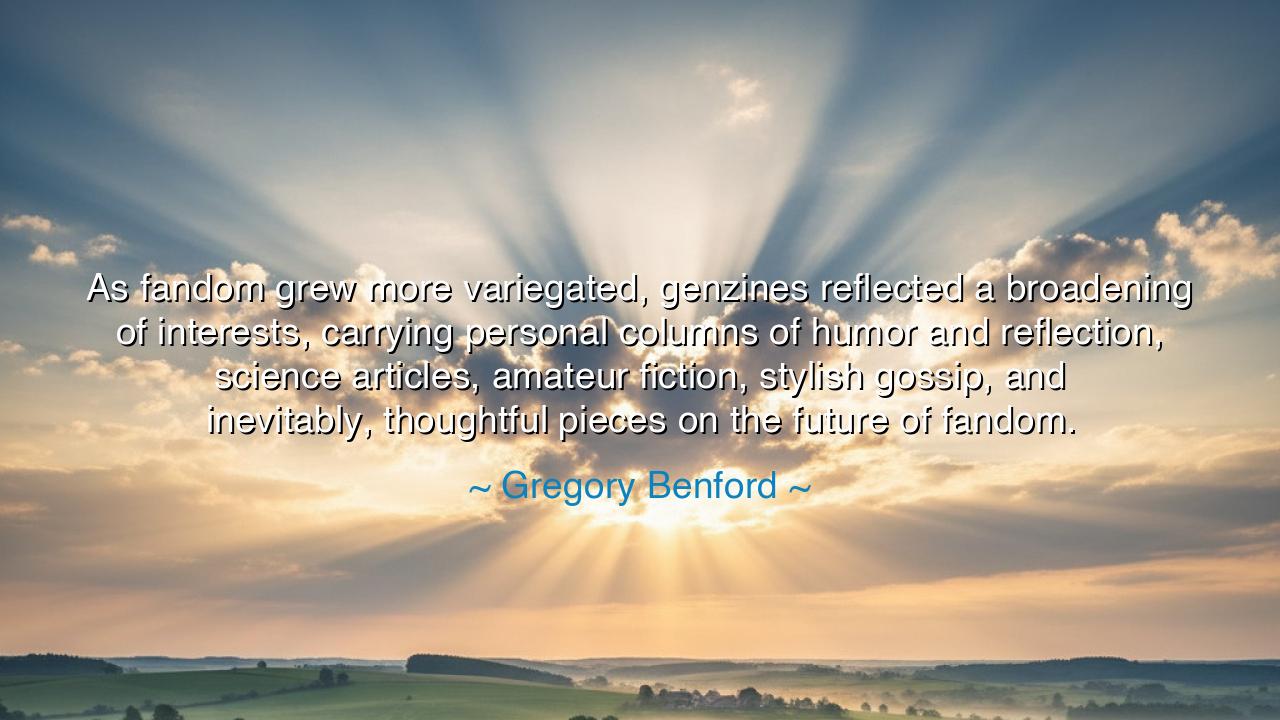
As fandom grew more variegated, genzines reflected a broadening
As fandom grew more variegated, genzines reflected a broadening of interests, carrying personal columns of humor and reflection, science articles, amateur fiction, stylish gossip, and inevitably, thoughtful pieces on the future of fandom.






Listen, O Seekers of Knowledge, for the words of Gregory Benford speak of an era in which the landscape of human interest and connection shifted profoundly, where once-narrow paths grew wide with the flowering of countless passions and pursuits. He said, "As fandom grew more variegated, genzines reflected a broadening of interests, carrying personal columns of humor and reflection, science articles, amateur fiction, stylish gossip, and inevitably, thoughtful pieces on the future of fandom." These words do not merely describe a phenomenon, but the transformation of a cultural movement—a movement that began as a small, niche interest and blossomed into something all-encompassing, something that touched the lives of many across generations.
To understand the depth of this statement, we must first understand the nature of fandom. In ancient times, the human spirit was often bound by a single pursuit, a single passion. The philosophers of Greece, like Socrates and Plato, devoted themselves to the pursuit of wisdom, while the warriors of Rome focused on the glories of conquest. But in more recent times, fandom emerged as something different—an ever-expanding field where people could gather not just to admire the exploits of heroes, but to immerse themselves in the vast worlds of fiction, science, and imagination. It was a space where people could join together to celebrate, critique, and engage with their interests in ways never before seen in human history.
The genzines, those fanzines born of the passionate energy of fandom, became the very medium that reflected this transformation. They were not merely publications, but living organisms, growing and evolving with the interests of their creators. Benford speaks of how these genzines captured a broadening of interests—how they became more than just forums for fanfiction or fan theories, but places of personal reflection, humor, and style. In this way, they mirrored the growth of fandom itself, which no longer confined itself to a singular genre or group, but embraced a wide spectrum of thought and expression. As the centuries passed, we saw the first inklings of these broader interests, from the bards who sang of heroes and gods to the scholars who debated the nature of the universe.
In the world of the genzines, one could find more than just a recounting of science fiction worlds or comic book heroes. Benford mentions that these fanzines began to carry columns of humor, science articles, and amateur fiction—all interwoven into a rich tapestry of thought, expression, and connection. This was not merely the birth of a new kind of writing; it was the birth of a new culture—one that drew from many different streams of human interest. Much like the Renaissance, when art, science, and philosophy flourished together, the genzines of the modern age began to reflect this broadening of knowledge and creativity. They became places where different voices, different passions, and different visions could converge.
Think of the great libraries of Alexandria, where scholars and thinkers from around the world came together to exchange ideas, philosophies, and knowledge. This was a place where the pursuit of knowledge was not confined to a single discipline, but where the interconnectedness of all knowledge was celebrated. The genzines of fandom took on a similar role, serving as a meeting point for those who sought to discuss not only the works of fiction but also the deeper questions that arose from them. Just as the philosophers of the ancient world used their writings to explore the nature of existence, so too did the writers and contributors to genzines explore the future of fandom, asking questions about the direction of their community, its role in the larger world, and the very essence of what it meant to be a fan.
The lesson of Benford’s words is one of connection and evolution. Fandom, once a narrow pursuit, became a multifaceted world in which people could share, create, and reflect on the vast expanse of human interests. The genzines were not simply vehicles for entertainment; they were mirrors of the growing complexities of human culture. They captured a moment in time when people realized that no interest, no passion, no pursuit was isolated—it was all part of a larger tapestry. Benford challenges us to recognize that the growth of fandom is not just a passing trend but a reflection of a deeper truth: that all of human experience is interconnected, and that our diverse interests are the threads that weave together the fabric of our collective consciousness.
Thus, O Seekers, let us take the wisdom of Benford to heart. In our own lives, we too must seek to expand our interests, to embrace the broadening of our perspectives, and to recognize the value in each expression of human thought and creativity. The world is no longer a place where one can isolate themselves in a single pursuit. Just as the genzines of fandom captured the spirit of growth and diversity, so too must we strive to reflect this spirit in our own lives. Let us not limit ourselves to a single path, but embrace the multiplicity of experiences and ideas that shape our world. By doing so, we, like the fans of old, will be part of a greater movement—a movement of shared knowledge, of collaboration, and of the joyous celebration of all that makes us human.






AAdministratorAdministrator
Welcome, honored guests. Please leave a comment, we will respond soon